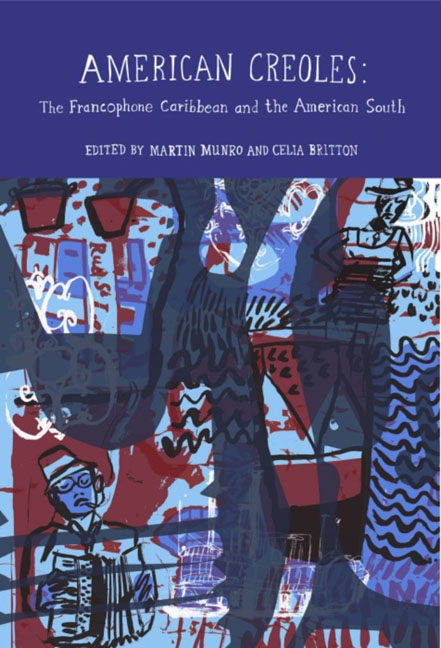Book contents
- Frontmatter
- Contents
- List of Illustrations
- Acknowledgements
- Introduction
- Creolizations
- Music
- ‘Fightin’ the Future': Rhythm and Creolization in the Circum-Caribbean
- Leaving the South: Frantz Fanon, Modern Jazz, and the Rejection of Négritude
- The Sorcerer and the Quimboiseur: Poetic Intention in the Works of Miles Davis and édouard Glissant
- Creolizing Jazz, Jazzing the Tout-monde: Jazz, Gwoka and the Poetics of Relation
- Intertextualities: Faulkner, Glissant, Condé
- Notes on Contributors
- Index
Creolizing Jazz, Jazzing the Tout-monde: Jazz, Gwoka and the Poetics of Relation
from Music
- Frontmatter
- Contents
- List of Illustrations
- Acknowledgements
- Introduction
- Creolizations
- Music
- ‘Fightin’ the Future': Rhythm and Creolization in the Circum-Caribbean
- Leaving the South: Frantz Fanon, Modern Jazz, and the Rejection of Négritude
- The Sorcerer and the Quimboiseur: Poetic Intention in the Works of Miles Davis and édouard Glissant
- Creolizing Jazz, Jazzing the Tout-monde: Jazz, Gwoka and the Poetics of Relation
- Intertextualities: Faulkner, Glissant, Condé
- Notes on Contributors
- Index
Summary
In a recent article in Black Music Research Journal, French sociologist Denis-Constant Martin proposed that Martinican writer Édouard Glissant's concept of creolization could help reconcile jazz's historical roots as an African American music with its recent universalization (Martin, 2008). Martin thus joined a growing group of scholars who use the concept of creolization in globalization studies in order to emphasize the fluid and unstable nature of culture. Meanwhile, scholars in postcolonial studies have embraced creolization's potential to celebrate the creative ingenuity of ‘subaltern and deterritorialized peoples’ and its power to subvert ‘older notions of cultural dissolution and disorganization’ (Khan, 2007: 237–38). However, a number of anthropologists have expressed reservations about this trend. Arguing that the historical process of creolization in the Caribbean has been fundamentally different from contemporary processes of globalization, these scholars advocate that creolization not be divorced from its original historical and geographic contexts (see Mintz, 1996 and 1998; Palmié, 2006 and 2007; Khan, 2007 for examples). Prompted by these debates, the present chapter tests Martin's postulate through a study of US saxophonist David Murray's collaboration with Guadeloupean musicians. Drawing on written, ethnographic and musical sources, I compare Martin's understanding of Glissant's créolisation with the meaning of creolization for the musicians involved in the Creole Project. I demonstrate that ‘creolization’ – and its related terms ‘Creole’ and ‘créolité ’ – continue to hold specific and disputed meanings in Guadeloupean society, thus problematizing their wider application as concepts capable of describing global processes of cultural exchange or identity formations.
Jazz and Glissant's Poetics of Relation
In his thought-provoking article, Martin seeks theoretical answers to the following questions: How can we account for the spread of jazz – and other African American or Afro-Caribbean musics – throughout the world and their transformation into countless regional variants while also acknowledging the central contribution of African American musicians? What makes jazz and other forms of African American music universal? In using terms like ‘universal’ or ‘universalization’, Martin does not suggest that jazz and black musics are played and received in the same way throughout the world but rather that there are few places, if any, where black musics have not been embraced, appropriated or blended with local traditions.
- Type
- Chapter
- Information
- American CreolesThe Francophone Caribbean and the American South, pp. 165 - 180Publisher: Liverpool University PressPrint publication year: 2012

